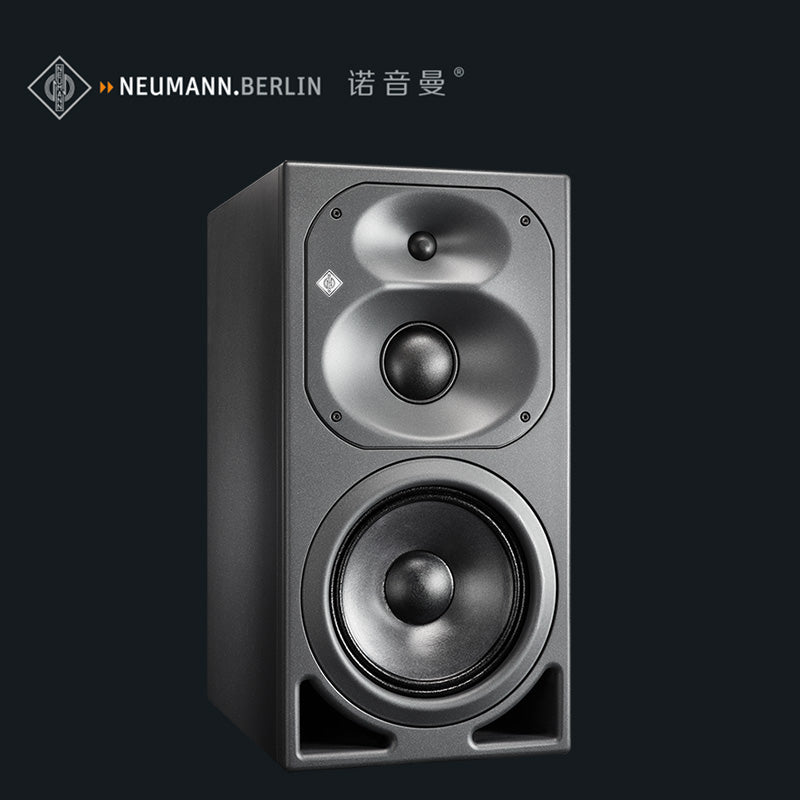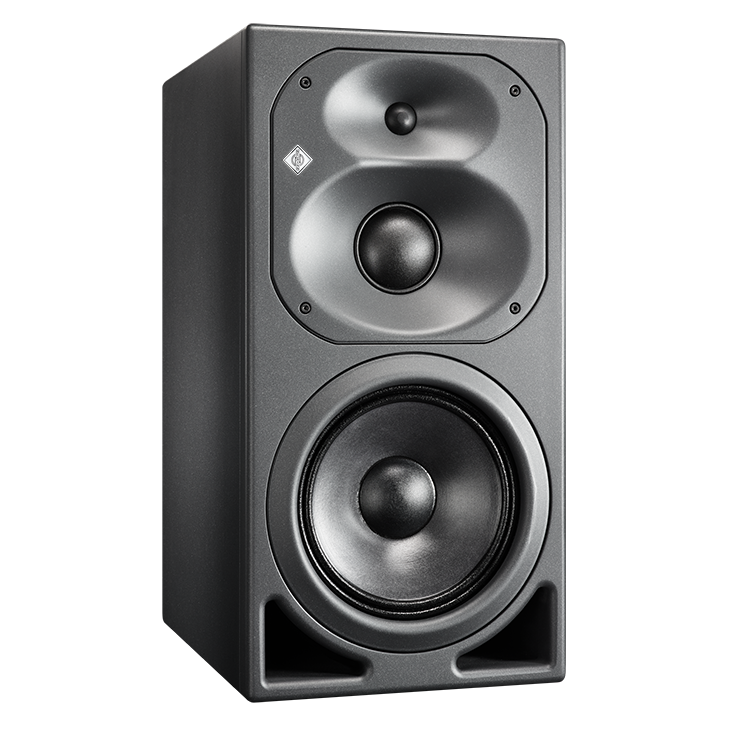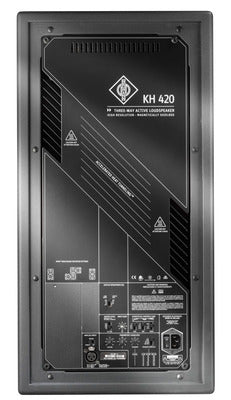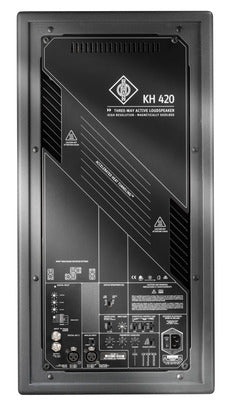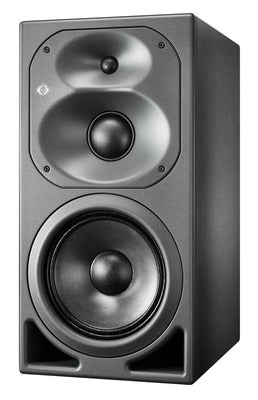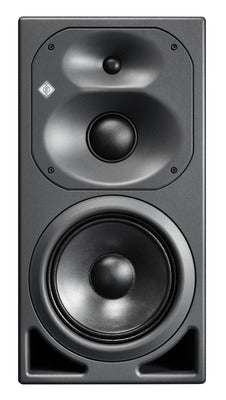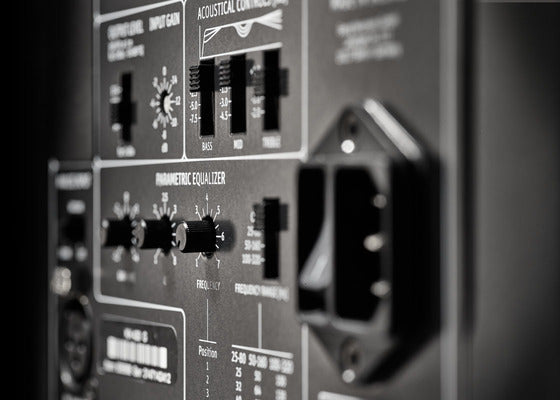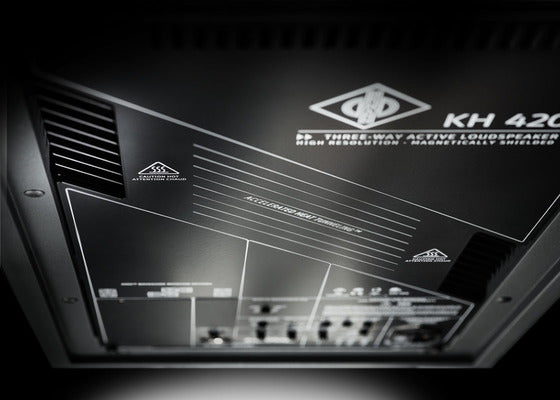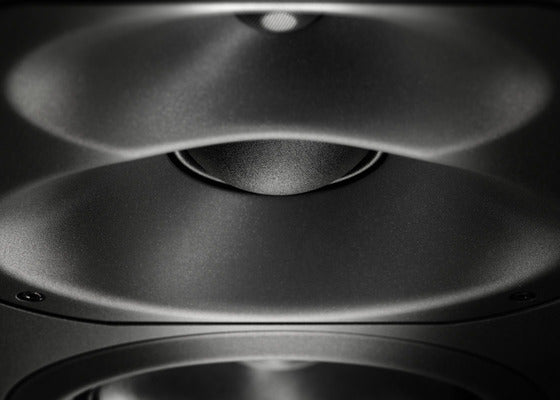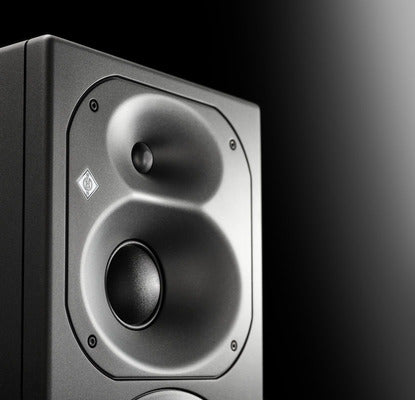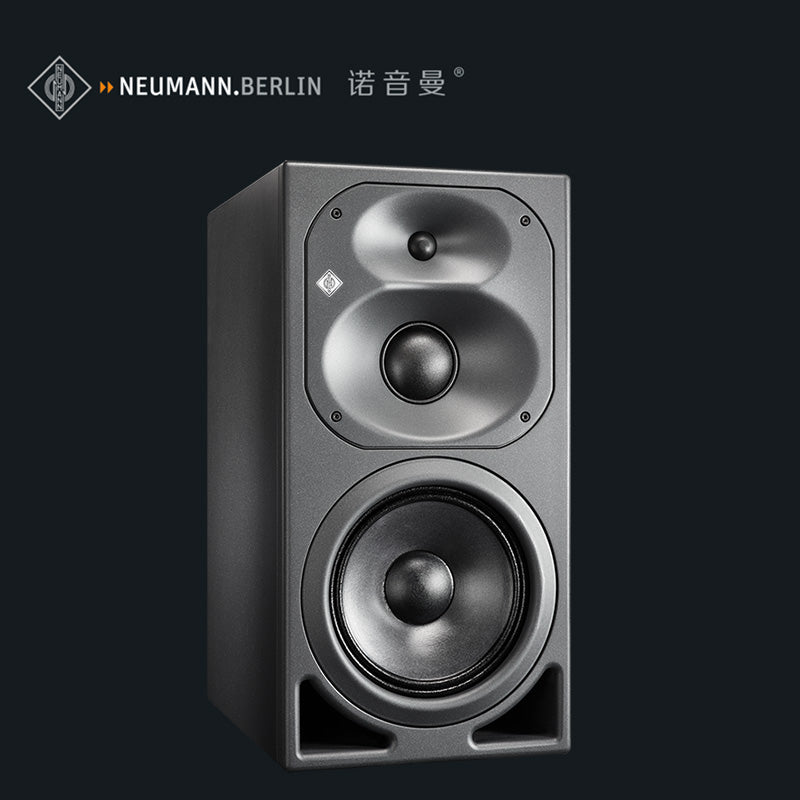
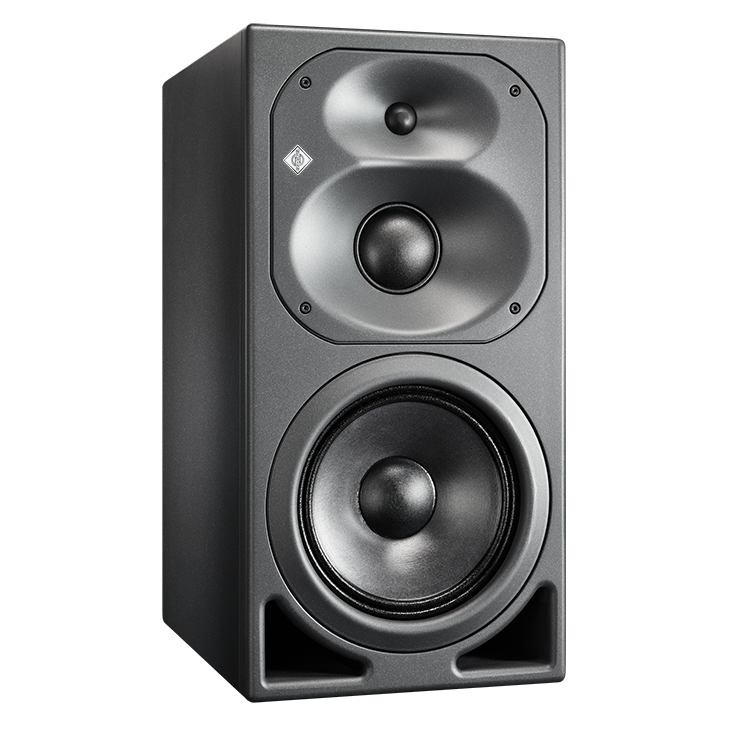
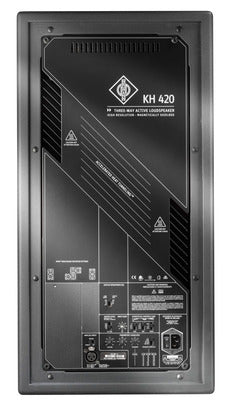
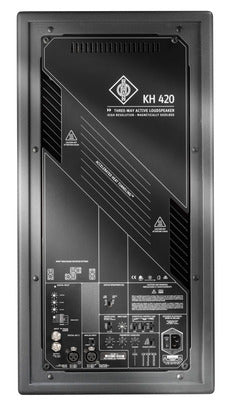
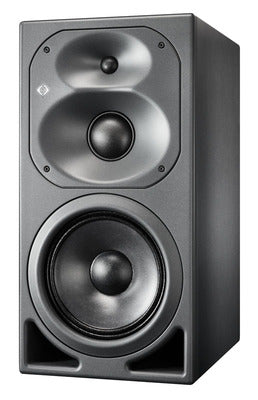
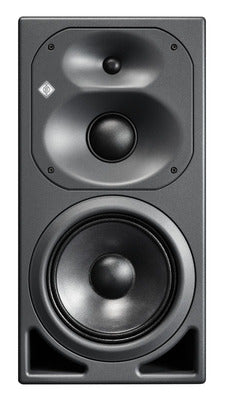
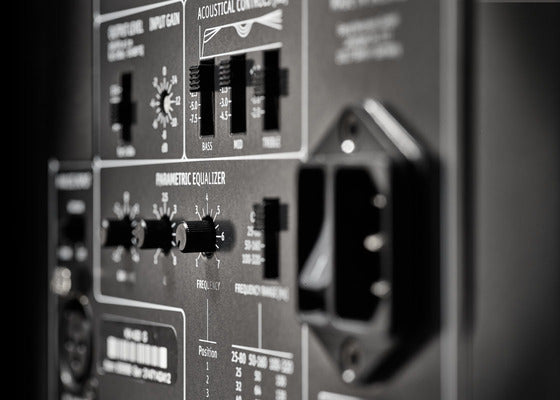
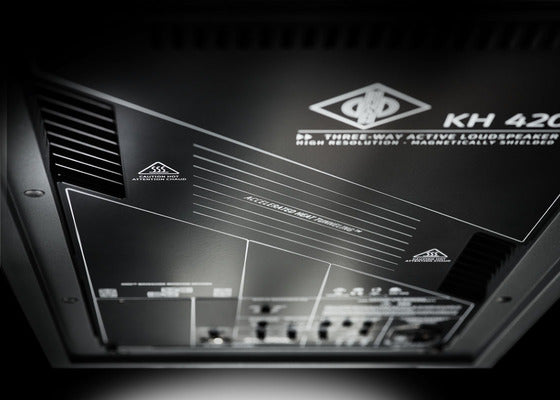
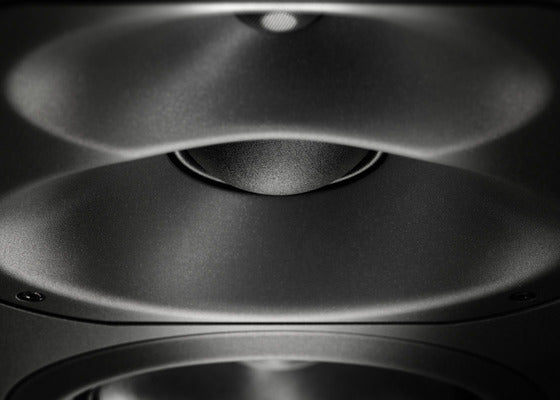
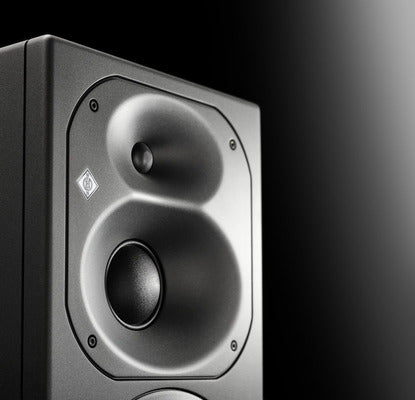
Collapsible content
Description
The gold standard in the midfield range
The KH 420 is designed for a working distance of 1.5 to 3 m (5’ to 9’). It handles this space effortlessly thanks to great power reserves and precisely concentrated dispersion. Even in diverse acoustical environments the KH 420 remains neutral and clear in every detail down to the subtlest nuances. No subtlety is lost; every sound element can be localized.
The KH 420 is a three-way tri-amplified monitor with thermally protected Class AB amplifiers (330 W and two times 140 W). Just like the drivers, its Mathematically Modeled Dispersion™ (MMD™) waveguide is engineered for optimum precision. Sound distributed in a horizontally precise manner ensures flexibility in the listening position; the narrower vertical dispersion reduces the negative effects of nearby reflections, for example from a desk or mixing console. The dispersion of the KH 420 is deliberately designed to be narrower, to guarantee reference sound at longer working distances.
Best working environment: Close to professional ears
The KH 420 is designed for midfield applications and as main monitor in project, music, broadcast and post-production studios for recording, mixing and mastering. And in a multi-channel system, it can also be freely combined with all other Neumann studio monitors.
Ports and high dynamics: No longer a contradiction
With its tri-channel amplifiers the KH 420 also realizes sound pressures of up to 122.4 dB. And it thereby retains high-resolution and neutral representation across the entire frequency response. This also includes an exceptional bass response down to 26 Hz. Despite using ports, there is no “overhang” or audible resonance in the low frequency range and the transient response is precisely controlled at all times.
The computer modeled chassis is constructed of LRIM™ materials which eliminates standing wave resonances and suppresses intermodulation distortion, especially in the midrange.
For demanding treble, our own specially developed, powerful alloy fabric dome ensures distortion-free reproduction. The fabric dome captures the midrange with utmost precision. Its ultralight material and the powerful neodymium magnet enable a significantly better transient response with considerably less distortion than comparable midrange drivers.
Digital input and delay option
The Digital Input Module DIM 1 expands the loudspeaker electronics by a digital XLR input, a digital BNC input and a digital BNC output (192 kHz/24 Bit) for flexible digital signal links. With the delay function (adjustment range 0 - 400 ms) of the DIM 1, the audio signal can be delayed to ensure audio-visual synchronization (lip sync). In addition, the high resolution of the delays (0.1 ms) allows equalization of the propagation delays. The delay can be added to both inputs (digital and analog). The KH 420 can be retrofitted with a DIM 1.
The KH 750 DSP subwoofer
In addition to its outstanding acoustic properties this subwoofer offers functions for non DSP-based Neumann monitors connected (analog) to its outputs regarding the interplay with the following tools:
- Automatic Monitor Alignment – Automatic room correction of stereo systems using the Neumann MA 1 measurement microphone (software for Mac/PC)
- Neumann.Control – Free iPad®-App for setup, operation, and room correction of stereo systems via guided and/or manual alignment
Hundreds of good reasons from the Neumann philosophy
The KH 420 has also been developed true to the Neumann philosophy for monitor loudspeakers. Every component, every shape, every signal and every wave motion is a consequence of this philosophy. No form or component is there without reason. There are hundreds of tangible reasons built into the KH 420, which all stand for exceptionally pure and neutral sound. These include, for example, curvatures of the housing that reduce edge diffraction. Also included is the pistonic output of the bass driver which does not give rise to harmonic distortions, even with the highest sound peaks. Some of these reasons are obvious in the KH 420. Others Neumann prefers to keep to itself. But together, each can be heard – sound professionals in both large and small studios all around the world can testify to this. You can read more about the Neumann philosophy for studio monitors here.
(1) In-house simulated tweeter with alloy fabric dome and robust metal grille
- Latest modeling techniques used to minimize non-linear (harmonic and intermodulation) distortion
- Low-distortion high frequency reproduction
- Grille protects against mechanical damage
(2) Rotatable elliptical Mathematically Modelled Dispersion™ (MMD™) waveguide
- Smoother off -axis response
- More forgiving of diverse acoustical environments
Wide horizontal dispersion
- Freedom of movement across the mixing console
Narrow vertical dispersion
- Reduces reflections off the mixing console
(3) Two-color + dimmable Neumann logo
- Displays operation status and activation of the extensive protection system
- Dimmable for low lighting level conditions or behind the screen applications
(4) In-house simulated, neodymium magnet, fabric dome, midrange driver with optimized low stray magnetic field
- Dedicated driver reproduces important midrange frequencies, which is especially important for speech and vocals
- Latest modeling techniques used to minimize non-linear (harmonic and intermodulation) distortion
- Low-distortion midrange reproduction
- Light-weight dome has better transient response and less breakup modes than cone designs
- High power magnet reduces harmonic and intermodulation distortion
(5) In-house modelled long-throw composite sandwich cone bass driver with Extremely Linear Force Factor™ (ELFF™), magnetic shielding and flow optimized die cast basket
- Damping of break up modes brings low distortion at high sound levels
- Linear pistonic motor gives a very low harmonic distortion even at high excursions
- Reduced air noise and improved rocking modes
(6) Large high-capacity flow-optimized bass reflex ports with pipe resonance damping
- Fast bass transient response
- Reduced bass compression at high output levels
- No coloration from organ pipe resonance
- Can be flush mounted
(7) Computer mechanically modeled three-way cabinet design using Low resonance Integral Molding™ (LRIM™) materials
- No standing wave resonances inside cabinet
- Reduced intermodulation distortion in midrange for a more transparent sound
- Reduced cabinet resonances
(8) 4-position bass, low-mid and treble acoustical controls
- More control in diverse acoustical environments
- Repeatable acoustical settings after moving loudspeakers
(9) Parametric equalizer
- More control in diverse acoustical environments
- Bypassable if not needed
- Three frequency ranges gives very fine control of equalization
(10) Wide range input gain and output level controls
- Easier interfacing with signal sources
(11) Display dimmer
- For low lighting level conditions or behind the screen applications
(12) XLR electronically balanced analogue input with ground lift
- Standard interfacing to professional equipment
- Reduced noise in electrically noisy environments and over-comes ground loops
(13) Universal dual (bass and mid/treble) switched-mode power supplies (100 … 240 V)
- One version works in any country and robust to poor quality mains supply
- Dual supply improves transient response
(14) Fully documented extensive mounting hardware range
- More flexibility in mounting cabinets in more diverse locations and backwards compatible to previous products
- Easy advanced planning for installations
(15) Electronics panel with generously dimensioned integrated Accelerated Heat Tunneling™ (AHT™) heat sink
- Improved heat dissipation leading to increased electronics reliability
Installation flexibility
- Remoteable electronics (REK 4) for ease of installation, less cabling, and convenience of use
(16) Powerful amplifiers with large headroom and overheat limiting
- Improved transient response
- Assured reliability and safety
Separate fast acting thermo limiters for woofer, midrange and tweeter to protect the voice coils and power amplifiers
- Woofer soft clip and excursion limiters
- Increases system reliability
- Allows extraction of the maximum performance from the system
More Features
Production consistency due to individual hand alignment in final testing
- Any KH 420 is “pair matched” to any other KH 420
Optional robust metal grille
- Can be used, if required, to protect the drivers
Data and Diagrams
| Free field frequency response ±6 dB | 25 Hz … 22 kHz |
|---|---|
| Free field frequency response ±3 dB | 26 Hz … 22 kHz |
| Free field frequency linearity deviation between 100 Hz and 10 kHz | ± 1.2 dB |
| Self-generated noise at 10 cm (with input gain set to 100 dB SPL for 0 dBu) | <20 dB(A) SPL |
| Sine wave output with a THD < 0.5 % at 1 m in half space | 95 dB SPL (>100 Hz) |
| Max. SPL calc. in half space at 3% THD at 1m (averaged between 100 Hz and 6 kHz) | 122.4 dB SPL |
| Max. SPL in full space at 3% THD at 1m (averaged between 100 Hz and 6 kHz) | 116.4 dB SPL |
| Bass capability: Max. SPL in half space at 3% THD at 1m (averaged between 50 Hz and 100 Hz) | 109.9 dB SPL |
| Max. short term SPL with IEC-weighted noise (IEC 60268-5) at 1 m, in typical listening conditions | 109 dB(C) SPL |
| Reproduction accuracy between 100 Hz and 10 kHz: 100%, 80%, 50% of loudspeakers produced | ±0.78; ±0.36; ±0.22 dB |
| Max. short term SPL with music material at 2.3 m in typical listening conditions (pair / full range) | 103 dB(C) SPL |
| Max. short term SPL with music material at 2.3 m, in typical listening conditions (pair with subwoofer) | 109 dB(C) SPL |
| Max. long term SPL with pink noise at 2.3 m, in typical listening conditions (single / pair full range) | 90 / 96 dB(C) SPL |
| Max. long term SPL with pink noise at 2.3 m, in typical listening conditions (single / pair with subwoofer) | 90 / 96 dB(C) SPL |
| Equalization: Mid | 0; -1.5; -3; -4.5 dB |
| Equalization: Parametric EQ: Gain | '+4 ... -12 dB |
| Equalization: Parametric EQ: Frequency | Bypass, 25 ... 80 Hz; 50 ... 160 Hz; 100 ... 320 Hz |
| Equalization: Parametric EQ: Q | 1 ... 8 |
| Display Brightness | White: 100%/60%/30%/off; Red: 100%/60%/30% |
| Output power midrange amplifier (THD+N with limiter deactivated: 10%) | 140 W |
| Output power midrange amplifier (THD+N with limiter deactivated: 0.1%) | 130 W |
| Midrange | 75 mm (3") with magnetic shielding |
| Cabinet weight when electronics remote located | 30.3 kg (66 lbs 13 oz) (+ 100 g (3 oz) with DIM 1 fitted) |
| Bass Extension (Hz, -6 dB) | 25 |
| Maximum output level (dB SPL) | 116.4 |
| Max. Listening Distance up to (m) | 11 |
| Analog input(s) | XLR: analog electronically balanced |
| Analog input impedance | >14k Ohms |
| Max. input level | +24 dBu (DIM 1: 18 dBu for analog delayed) |
| Common mode rejection ratio (CMRR) | >56 dB @ 15kHz |
| Input gain control (sensitivity) | 0 dB ... -15 dB |
| Output level control (output level in 1 m based on 0 dBu input level) | 94; 100; 108; 114 dB SPL |
| Equalization: Bass | 0; -2.5; -5; -7.5 dB |
| Equalization: Treble | +1; 0; -1; -2 dB |
| Controller design | Analog; active |
| Crossover frequency | 570 Hz and 2.0 kHz |
| Crossover slope | 24 dB/oct; 4th order |
| Protection circuitry | Independent thermo limiters for woofer, midrange dome and tweeter. Woofer soft clip and excursion limiters. Amplifier overheat. |
| Infrasonic filter: frequency; slope | 9 Hz; 18 dB/oct. |
| Display: On; Normal Operation | Neumann logo “White” |
| Display: Limit / Clip / Errors / Protection /Boot Mute / Shut Down Mute | Neumann logo “Red” |
| Output power woofer amplifier (THD+N with limiter deactivated: 10%) | 330 W |
| Output power tweeter amplifier (THD+N with limiter deactivated: 10%) | 140 W |
| Output power woofer amplifier (THD+N with limiter deactivated: 0.1%) | 295 W |
| Output power tweeter amplifier (THD+N with limiter deactivated: 0.1%) | 130 W |
| Mains Power Supply: input voltage; frequency | 100-240V; 50/60 Hz |
| Power consumption (230 V / 100 V): Idle | 60 W (+5W when DIM 1 fitted) |
| Power consumption (230 V / 100 V): Full output | 800 W |
| Cabinet material | Wood cabinet, polyurethane waveguide, aluminum electronics panel |
| Cabinet surface finish; color (front / back) | Painted; metallic anthracite (RAL 7021) / black (RAL 9005) |
| Operating conditions | +10° C to +40° C (+50° F to +104° F); <90% RH, non-condensing |
| Transport/storage conditions | -25° C to +70° C (-13° F to 158° F); <90% RH; non-condensing |
| Woofer | 265 mm (10") with magnetic shielding |
| Tweeter | 25 mm (1") with protecting black metal grille |
| Mounting points | 8 x M5 on rear panel |
| Product dimensions (height x width x depth) | 645 x 330 x 444 mm (25 3/8" x 13" x 17 1/2") |
| External net volume | 93 liters |
| Packed dimensions (height x width x depth), mm (inches) | 775 x 610 x 590 mm (30 1/2" x 15" x 14 1/8") |
Diagrams
KH 420 - Parametric - EQ

KH 420 - Group Delay

KH 420 - Cumulative Spectral Decay

KH 420 - Vertical Directivity Plot (vertical cabinet orientation)

KH 420 - Horizontal Directivity Plot (vertical cabinet orientation)

KH 420 - Harmonic Distortion at 100 dB SPL (Purple: THD, Red: 2nd harmonic, Green: 3rd harmonic)

KH 420 - Bass, Mid and Treble Acoustical Controls

KH 420 - Maximum SPL at 1m (Green: 10% THD, Red: 3% THD, Blue: 1% THD)

KH 420 - Free-Field Response

KH 420 - Horizontal Directivity Plot (horizontal cabinet orientation)

KH 420 - Harmonic Distortion at 90 dB SPL (Purple: THD, Red: 2nd harmonic, Green: 3rd harmonic)

KH 420 - Harmonic Distortion at 95 dB SPL (Purple: THD, Red: 2nd harmonic, Green: 3rd harmonic)

KH 420 - Vertical Directivity Plot (horizontal cabinet orientation)


